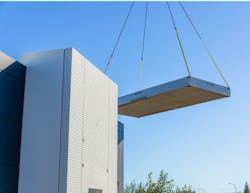Pittsburgh's green manufacturing has some star power.
Renowned actor Michael Keaton is joining the growing green movement in Pittsburgh. “Growing up, many of my neighbors worked in Pittsburgh’s famous steel plants; the lore was that a businessman would take an extra white shirt to work because the one he started with would get so dirty from the mills’ polluted air that he’d have to put on a fresh one to come home,” Keaton, who was born and raised in the Pittsburgh area, said in a statement on April 22.
To be part of the effort to ensure a more sustainable future, Keaton is taking an ownership stake in a partnership with Nexii, a Canadian enterprise and Trinity Commercial Development, based in Pittsburgh, that will develop a sustainability-based manufacturing plant. The plant, which will be built by Nexii Building Solutions Inc., is the first plant built entirely from Nexii’s sustainable concrete alternative, Nexiite.
In fact, the company will be producing the material and building the plant at the same time. Nexii’s sister Pennsylvania plant, which will open in Hazleton, will produce the Nexiite panels and other materials used to build the Pittsburgh plant. The lightweight panels, which are both thermally efficient and less carbon-intensive than concrete, will be shipped to Pittsburgh and assembled onsite, which will reduce build time by 75% as well as on-site waste. The plant, which will be on a redeveloped brownfield site, is set to open in 2022.
“Nexii’s new plant will create more than 300 green, healthy job opportunities and help revitalize my hometown in a way that helps folks right now while paving the way for future generations,” said Keaton.
Becoming part of a green manufacturing movement in Pittsburgh is what attracted Craig Rippole, president of Trinity Commercial Development, to the project. “If you are trying to move the needle on climate change, you have to focus on the highest impact which is the building and construction sector. They contributed 39% of the world’s carbon emissions. Building in a sustainable manner is key to addressing this issue,” explains Rippole. He notes that when Nexii built a Starbucks store in Abbotsford, British Columbia, it was designed to reduce the store's carbon emissions by 30%. Rippole points out that since only one bag of trash was created during the six days of construction at Starbucks, this level of waste reduction is achievable.
Rippole also says that companies need to review their resources as well. “If you look at what’s happening with lumber’s price increases making it impractical or unfeasible to build, finding alternative sustainable materials that are more cost-competitive, less labor-intensive and quicker is essential.”
Seeking sustainable projects is key to the area’s strategic plan. “When the Nexii project was presented, it was exactly the type of manufacturing that we want in Pittsburgh,” said Mark Anthony Thomas, president of the Pittsburgh Regional Alliance, a 10-country economic development organization. “This type of innovative technology which increases sustainability in the manufacturing sector is a key part of the future development of our city. We want to be a hub for that type of investment.”
Investments, such as what the city is doing with green manufacturing, are part of a strategy that began in 2012 when the Pittsburgh 2030 District was created. Part of the international 2030 Districts Network, the Pittsburgh 2030 District is comprised of 556 properties, which have committed to a goal of achieving 50% reductions in energy use, water consumption, and transportation emissions by the year 2030.
Having an ecosystem of sustainability offers a large advantage to the manufacturing community, and the Nexii building exemplifies how manufacturing will continue to develop. “Manufacturing will lead the technology revolution over the next decade as it continues to adopt technology at a quick pace,” says Thomas. “Manufacturing will be the intersection where IoT, robotics, and AI will continue to develop. For young talent, there couldn’t be a more exciting time to join this field.”
The current and future availability of talent, both in terms of talent to staff the company, but also the talent located here that will create the future technology that can help the plant advance, was a major consideration in locating the plant in Pittsburgh. The area is home to 88 universities and post-secondary institutions that graduates 5,200 graduates in manufacturing-related fields annually.
And the city has developed a reputation for creating innovative technologies, the most recent example being its influential robotics sector. As far back as the 70s Carnegie Mellon University had a Robotics Institute and was the first to establish an undergraduate degree in artificial intelligence. Currently, the city houses a Robotics Row, which includes companies such Argo AI, Astrobotic, Bossa Nova Robotics, Carnegie Robotics, HEBI Robotics, IAM Robotics, Idelic, RE2 Robotics, Simcoach Games, and Voci Technologies. A larger ecosystem of 50 organizations called Pittsburgh Robotics Network supports this industry.
Support for advancing technology has been strong in the region. However, it goes beyond that. "There is also an alignment across all partners in terms of how to have equitable development with regard to the social impact,” says Rippole. “The manner in which all the organizations work together and share the same values to create sustainable projects such as this is why I feel it’s an ideal place for green building and manufacturing to prosper.”
Those considerations are why Thomas envisions more people choosing manufacturing as a career. “Tech talent hasn’t always looked to join manufacturing companies and I think this is a moment of correction,” Thomas says. “Manufacturing is at the forefront of many aspects of sustainability.”
About the Author
Adrienne Selko
Sr. Editor
Focus: Workforce, Talent
Email: [email protected]
Follow Me on Twitter: @ASelkoIW
Senior Editor Adrienne Selko has written about many topics over the 17 years she has been with the publication and currently focuses on workforce development strategies. She is also a senior editor at Material Handling & Logistics and EHS Today.
Previously Adrienne was in corporate communications at a medical manufacturing company as well as a large regional bank.
She is the author of Do I Have to Wear Garlic Around My Neck?, which made the Cleveland Plain Dealer's best sellers list.


